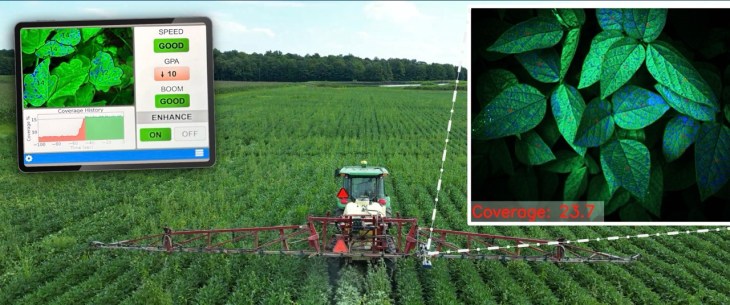A 2021 study found that if farmers didn’t use pesticides, they would lose 78% of fruit production, 54% of vegetable production, and 32% of cereal production. At the same time, the way pesticides are delivered is not ideal: The only way to guarantee enough pesticide distribution is to spray too much. That isn’t great for farmers’ wallets or the environment.
Along comes AgZen, a company born out of over a decade of MIT engineering research, with a new solution that uses AI to ensure that the plants get sprayed just enough, using real-time adjustments to optimize the use of pesticide. The company’s CEO, Vishnu Jayaprakash, shared with TechCrunch that RealCoverage can detect droplets as small as 150 microns and can offer real-time adjustments to spray parameters like pressure, rate, boom height, or speed. This allows for maximum application efficiency at speeds of up to 12 mph, the company claims.
The implications of this technology are vast. AgZen claims that its algorithms and optimizations can reduce chemical usage by up to 50%, significantly lowering input costs for farmers while maintaining crop health and yield. AgZen has been testing its product through more than three years of field trials on various crops and tells TechCrunch that last year it conducted 12 successful pilots and trials across the U.S. and Europe with some of the largest growers in the world.
The real winner in all of this may prove to be public health and the environment. With studies indicating widespread contamination of agricultural streams, wells, and aquifers due to pesticide runoff, and the global soil at high risk of pesticide pollution, agtech companies are scrambling for solutions. By reducing foliar pesticide usage by 30% to 50%, AgZen’s technology might help mitigate these impacts, aligning with the critical need for improved spray efficiency highlighted in recent reports.
The company also suggests that RealCoverage may prove to be a valuable tool for farmers trying to ward off regulators — the EPA has been rattling its saber over pesticide runoff for a while. By providing precise data on pesticide volume reaching the target in real time, it can improve pesticide tracking, reduce environmental impact, and offer insights for designing new formulations and optimizing farm operations globally.
AgZen is preparing to launch RealCoverage commercially later this year through a lease-to-own program, which helps put the system into financial range for farmers. The company suggests that by reducing the amount of chemicals used, the system pays for itself within a season.
